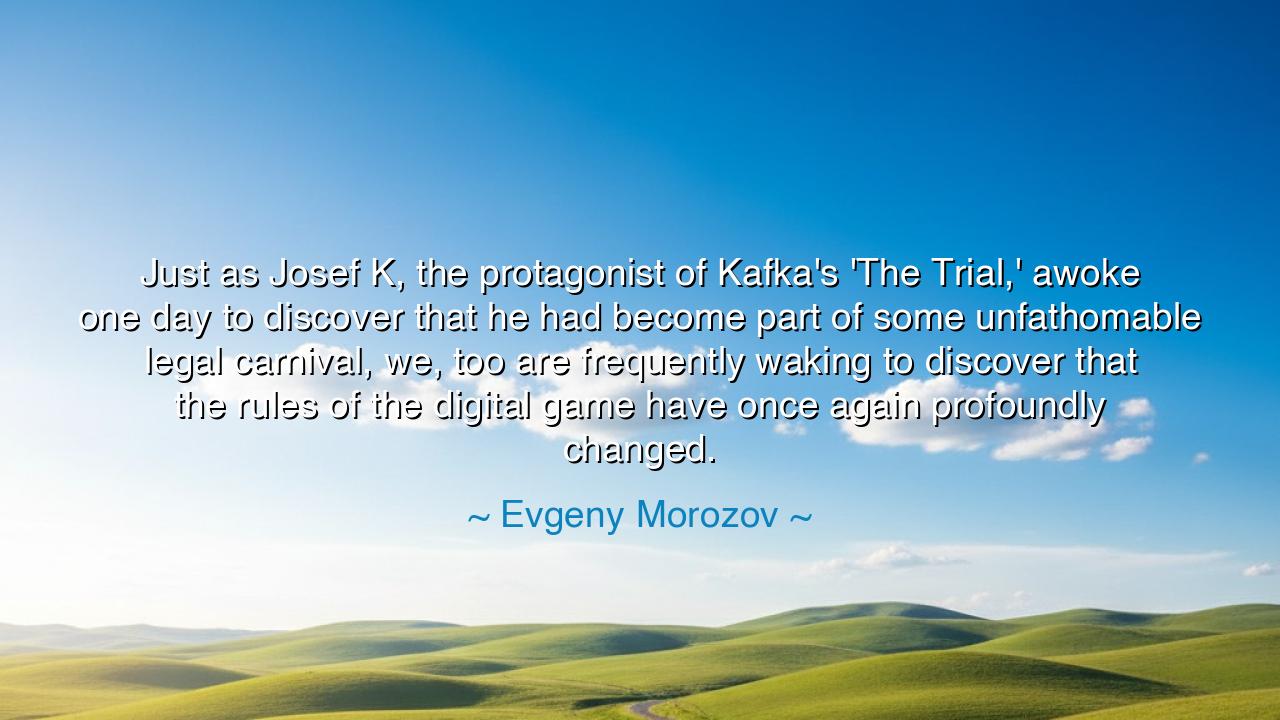
Just as Josef K, the protagonist of Kafka's 'The Trial,' awoke
Just as Josef K, the protagonist of Kafka's 'The Trial,' awoke one day to discover that he had become part of some unfathomable legal carnival, we, too are frequently waking to discover that the rules of the digital game have once again profoundly changed.






In the words of Evgeny Morozov: “Just as Josef K, the protagonist of Kafka’s The Trial, awoke one day to discover that he had become part of some unfathomable legal carnival, we, too, are frequently waking to discover that the rules of the digital game have once again profoundly changed.” These words resound with the unease of the modern age, echoing the fear of ancient prophets who warned of powers unseen, shifting and reshaping the world without the consent of those bound by them. Morozov speaks of the bewilderment that arises when laws, whether of courts or of technology, are veiled in secrecy, forever changing beneath our feet.
The ancients believed that the gravest danger to a people was not the tyranny of swords, but the tyranny of uncertainty. In Kafka’s tale, Josef K finds himself ensnared in a labyrinth of law without clarity or explanation, his very existence weighed by rules he cannot comprehend. So too, Morozov teaches, are we caught in a labyrinth of digital rules—algorithms, terms of service, hidden policies—that govern our lives in ways we do not see and cannot easily question. One day the game is one way; the next, it has shifted, and we are left scrambling in confusion, much like Kafka’s hapless protagonist.
Consider the story of social media platforms, those great digital arenas where voices rise and fall. For years, they promised freedom, connection, and equality of speech. Yet suddenly, without notice, rules change. What was once permitted becomes forbidden, what was once private becomes public, what was once free becomes costly. Entire livelihoods have collapsed overnight when algorithms were altered, just as Josef K’s life unraveled under the weight of invisible decrees. This is the “legal carnival” of the digital age: rules enforced without transparency, power wielded without accountability.
History itself gives us parallels. In the courts of Byzantium, emperors ruled not only with armies, but with decrees that shifted like sand. A noble might awaken one morning in favor, only to find himself condemned by laws rewritten in the night. Stability dissolved, for no man could be sure of the rules. In our own time, though the emperors are digital giants and the palace is the network, the feeling is the same. We awaken to a new decree, and the terms of our existence are altered, whether in how we work, how we speak, or how we are seen.
The deeper meaning of the quote is this: power cloaked in obscurity is the most dangerous of all. When rules are known, even if harsh, one can prepare, resist, or endure. But when rules shift silently, unpredictably, they erode the very ground upon which society stands. The ancients would call this chaos disguised as order, a false stability where the game is forever tilted by unseen hands. Morozov warns us that in the digital realm, this danger is ever present—that we are like Josef K, players in a contest we never chose, subject to laws we do not write.
And yet, the lesson is not despair but vigilance. If we cannot halt the tide of change, we can at least demand clarity, transparency, and accountability from those who hold the levers of the digital world. Just as citizens once demanded constitutions to bind kings and parliaments to check rulers, so too must the people of today demand oversight of the powers that script the digital game. Without this, we risk becoming permanent subjects in a carnival where justice and fairness are illusions.
So let this teaching be passed on: do not accept blind obedience to rules you cannot see. Question the structures of power, demand transparency, and cultivate wisdom in the use of technology. In your own life, read carefully, act mindfully, and teach others to discern the hidden patterns. For the digital world is not mere entertainment—it is the new foundation of human life. And remember: if we fail to guard our freedom in this realm, we will awaken, like Josef K, to find ourselves judged by laws we never knew existed.






AAdministratorAdministrator
Welcome, honored guests. Please leave a comment, we will respond soon